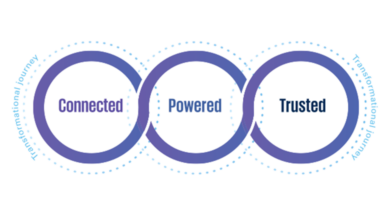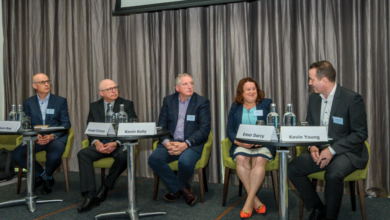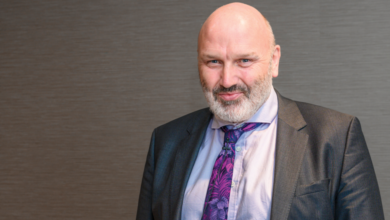A digital government

Northern Ireland’s Civil Service (NICS) is currently undergoing a digital transformation. The man in charge of this transition, Paul Wickens, talks to Owen McQuade about the aims of the programme.
The Northern Ireland Civil Service (NICS) is in the middle of a digital transformation. Spearheading this transformation is the Department of Finance and Personnel’s Enterprise Shared Services (ESS), which is tasked with delivering efficient and effective customer focused services.
 Paul Wickens outlines the ambitious programme to transform a number of key processes to become truly digital, with the objective of improving services and delivering efficiency savings.
Paul Wickens outlines the ambitious programme to transform a number of key processes to become truly digital, with the objective of improving services and delivering efficiency savings.
“Every department has produced an action plan and the key thing is that the Executive has endorsed it.”
16 by 16
The headline for the digital transformation programme is ‘16 by 16’ in which 16 online projects are planned to be delivered by April 2016. Wickens confirms that the ‘16 by 16’ programme is ahead of schedule and is very much focused on the “public facing side” of digital transformation. Finance Minister Arlene Foster has given a very clear commitment to the programme and although the initial commitment is for 16 services, more than 30 citizen facing services are being worked on as part of the ambitious programme.
Wickens stresses that the target of having 16 services completed by March 2016 “perhaps reflects an artificial threshold.” The Department of Finance and Personnel (DFP) carried out a landscape review two years ago which fed into the Citizen Contact Strategy to determine which services are being used by the public most frequently right across government. In order to select those processes that had significant amount of interaction with “bigger volumes of transactions,” a threshold of 10,000 transactions per year was set. If a service used more than that, it was placed in the 16 by 16 priority bracket but if used less than 10,000 times, the service will be developed by the specific department’s digital action plan. In practice he says that the list of priority projects for next year is more 30 plus than 16.
The success of the NICS shared services programme has been widely recognised and ESS now delivers a range of substantial services, some of which have opened up new revenue streams for different departments e.g. the ability for the public to purchase birth, death and marriage certificates and digitally search publically accessible records for their family’s history. This service has created a business all of its own for the General Registry Office. More recently, the process of digitalising AccessNI is also underway. Security vetting used to be a lengthy paper driven process, now there is very clear evidence of a significant streamlining and improvement of the process by making that a digital service.
Digital action plans
While the 16 by 16 programme is in full flow, each department is also preparing for digital transformation with their own ‘digital action plans.’ There is also now a ‘Digital Champion’ on the board of each department. Whilst much of the initial focus has been on the 16 by 16 programme Wickens sees the focus now shifting to the departments’ action plans.
 “We need to start focusing on what each department is doing,” said Wickens. “Every department has produced an action plan and the key thing is that the Executive has endorsed it. The head of the civil service, Malcolm McKibbin, has issued a mandate on it, which is quite a rare thing. It is very clear that he has taken a personal interest in it.
“We need to start focusing on what each department is doing,” said Wickens. “Every department has produced an action plan and the key thing is that the Executive has endorsed it. The head of the civil service, Malcolm McKibbin, has issued a mandate on it, which is quite a rare thing. It is very clear that he has taken a personal interest in it.
Simon Hamilton was also passionate about the whole thing during his time as Minister and Arlene Foster has now taken on the mantle.”
It is clear DFP is not content to rest on its laurels in the implementation of digital transformation and in March this year it signed a concordat with the Estonian Information Systems Authority.
Estonia is a global leader in digital government and the concordat allows for the exchange of people, knowledge and intellectual property rights between the two jurisdictions.
Estonia has taken quite a radical approach that has seen real results.
For example, it is illegal in Estonia to exchange paper between government departments, it all has to be done digitally. ESS is taking advantage of the concordat by placing an Estonian on its digital advisory board (Aet Rahe), along with Queen’s Emeritus Professor Ron Perrott, Rhys Lewis (ex-BBC) and one fast track civil servant, Karen McCamley.
Estonian citizens also have a digital ID card and this is something that is not available here. “For verification here you have to let someone see you and bring with you three things such as a passport, driving licence and a utilities bill says Wickens. “We’re working on providing a user ID so you can log on to access online government services There will still be a one off need to go to a trusted provider but that will give you the ability after that to go online to apply for things like a driving license and passport.”
Digital shared services
The Executive has endorsed a mandate to roll out shared services to the wider public sector in Northern Ireland. Today the NICS has two different Oracle platforms for finance and HR payroll. Wickens suggests that for the relatively small size of Northern Ireland, one platform should be able to support all public service administration. However he recognises that simply mandating all public sector organisations should have to use an ESS platform may prove difficult and that a system where every organisation is a shareholder may work better. He says that serious consideration is being given to establishing an alternative delivery model for shared services.
With Wickens’ experience across the public and private sectors he sees “technology as an enabler of business change” and a key aspect of any digital transformation is the adoption of technology. “Getting key services to the public with an efficient ‘develop once, deploy anywhere’ mantra is at the core of the entire digital transformation and in order for this to work cloud technology will need to be relied upon,” observes Wickens.
He believes that: “Once the utilities, infrastructure and network are in place everything is possible.” It has been decided that data will be kept within the jurisdiction of Northern Ireland and that a ‘private cloud’ route is preferred.
Future
“The immediate focus is to get online authentication and verification working in a way the public wants and needs because that will initiate a drive for future digital services,” says Wickens. He also says that it is envisaged that the 16 by 16 programme will be delivered by April 2016 and “will show that the government is a market leader in this area.”
Looking further into the future, he says that there will be drive to adopt ‘agile’ as a methodology across the public sector. “It is the belief of the NICS management teams that the days of writing large statements of requirements and doing traditional procurements on a like for like basis are gone. We’ve set up a governance mechanism that will intercept any business cases that try to do that and basically say that you have to do it in an ‘agile’ way and reuse things that we have already invested in,” says Wickens. “People like doing procurement all for themselves and in their mind reduce their risk, but what we are trying to do is deliver more quickly and more cost efficiently to provide better services for citizens.”
When asked about what he is most proud of to date and what he hopes to achieve with the digital transformation in the future, Wickens explains that delivering a fully functioning shared services organisation and proving that it works has been his highlight so far. Looking ahead, he stresses his enthusiasm for finding a way to change things for the better is what keeps him motivated. “Looking at the way government delivers services traditionally, they’re very good at it and very effective but it is expensive and it takes a long time. The digital transformation is giving us the opportunity to look at the whole thing differently and seeing how we can change things is what gets me excited,” Wickens declares.





